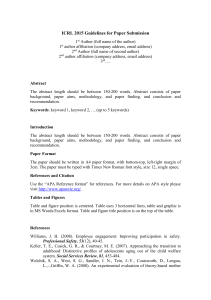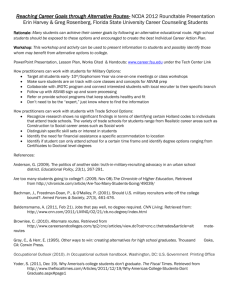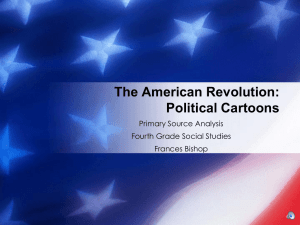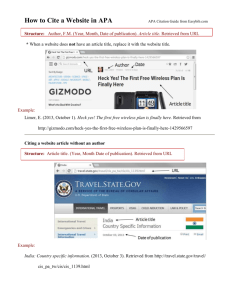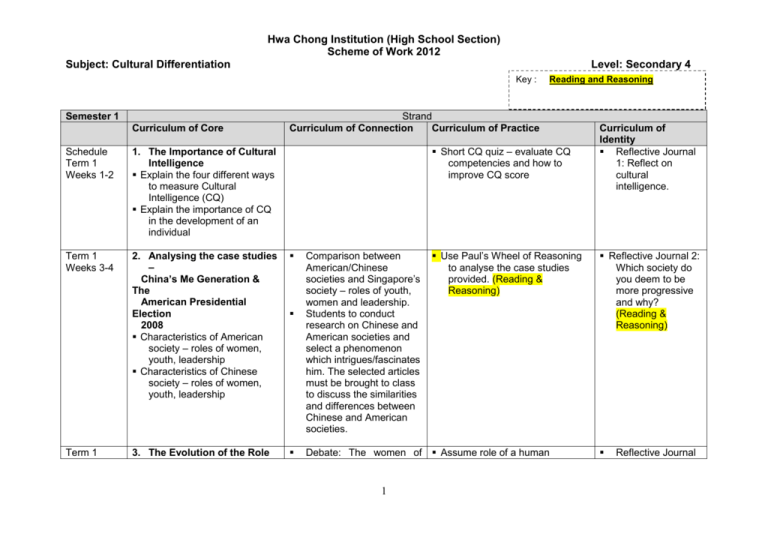
Hwa Chong Institution (High School Section)
Scheme of Work 2012
Subject: Cultural Differentiation
Level: Secondary 4
Key :
Semester 1
Curriculum of Core
Strand
Curriculum of Connection
Curriculum of Practice
Short CQ quiz – evaluate CQ
competencies and how to
improve CQ score
Schedule
Term 1
Weeks 1-2
1. The Importance of Cultural
Intelligence
Explain the four different ways
to measure Cultural
Intelligence (CQ)
Explain the importance of CQ
in the development of an
individual
Term 1
Weeks 3-4
2. Analysing the case studies
–
China’s Me Generation &
The
American Presidential
Election
2008
Characteristics of American
society – roles of women,
youth, leadership
Characteristics of Chinese
society – roles of women,
youth, leadership
3. The Evolution of the Role
Term 1
Reading and Reasoning
Comparison between
American/Chinese
societies and Singapore’s
society – roles of youth,
women and leadership.
Students to conduct
research on Chinese and
American societies and
select a phenomenon
which intrigues/fascinates
him. The selected articles
must be brought to class
to discuss the similarities
and differences between
Chinese and American
societies.
Use Paul’s Wheel of Reasoning
to analyse the case studies
provided. (Reading &
Reasoning)
Debate: The women of Assume role of a human
1
Curriculum of
Identity
Reflective Journal
1: Reflect on
cultural
intelligence.
Reflective Journal 2:
Which society do
you deem to be
more progressive
and why?
(Reading &
Reasoning)
Reflective Journal
Hwa Chong Institution (High School Section)
Scheme of Work 2012
Subject: Cultural Differentiation
Semester 1
Curriculum of Core
Weeks 5-7
of Women – Stature of the
Chinese Woman
Definition of gender equality
Status of women in China - in
cities and in rural towns
Progress of the status of
women in China from the
collapse of the Qing Dynasty
to present
4. The Evolution of the Role
of Women - Role of
Feminism in America
Status of women in America
Hillary Clinton as a
representation of the progress
which women has made in
America (Candidacy in 2008
and her position in American
government)
Term 1
Weeks 8-10
5. Youth Trends – Political
Activeness in China in the
20th Century & Political
Apathy in Modern China
Level: Secondary 4
Strand
Curriculum of Connection
Curriculum of Practice
America have progressed
leap and bounds ahead in
their fight for gender
inequality, as compared
to the women in China.
To what extent do you
agree
with
this
statement?
How far do you believe
that it is possible for
gender equality to be
achieved in China?
(Reading & Reasoning)
Discussion: is youth
apathy necessarily an
evil?
(Reading & Reasoning)
Reasons for political apathy
among youth in China
2
resource consultant in a MNC.
The company is planning to
send a female American to
China to manage a department.
Identify the cultural differences
she might encounter and how
she could overcome these
differences and exercise her
leadership effectively over a
team of Chinese employees.
Curriculum of
Identity
3: How have the
changing roles of
women in society
made an impact on
you? You may
draw on examples
from China, the
United States
and/or Singapore.
Assume role of a political analyst: [EXAM]Reflective
compare the extent of youth
Journal 4: Reflect
apathy in China and America.
on youth apathy.
Propose how the youths can be
Also, how far do
engaged in the country in which
you see yourself
youth apathy is more evident
as an apathetic
youth?
Hwa Chong Institution (High School Section)
Scheme of Work 2012
Subject: Cultural Differentiation
Semester 1
Curriculum of Core
Level: Secondary 4
Strand
Curriculum of Connection
Curriculum of Practice
Implications of political apathy
among youth in China
Extent of youth apathy in
China
[EXAM]Reflective
Journal 5: Reflect
on the seminar
discussions and
course thus far.
Youth Trends – The 08
Campaign: Tapping into
the power of apathetic
American youths
Reasons for political apathy
among youth in America
Role of Obama’s presidential
campaign in overturning
youth apathy in America
Extent of youth apathy in
America
6.
Term 2
Weeks 1-3
Youth Trends – Education
in China
Priorities of the Chinese
education system
Issues and concerns with
how education is failing to
prepare students with skills
to excel in a globalised
world (Issues: academicdriven, cheating,
competitiveness)
7.
Curriculum of
Identity
Case study: The Tiger
Mother’s beliefs are not
exclusive to Asian and
Chinese beliefs and are
reflective of American
parents too. How far do
you agree?
(Reading & Reasoning)
3
Role-play: A classroom scenario
where a student from China
enters and interacts in an
American classroom. Illustrate
the cultural difficulties/issues he
might face. (Other scenarios
can include an American
student who enters a
classroom in China, a
classroom in China with an
American teacher, a classroom
in America with a teacher from
Reflective Journal 6:
Reflect on
education and your
ideals of
education.
(Reading &
Reasoning)
Hwa Chong Institution (High School Section)
Scheme of Work 2012
Subject: Cultural Differentiation
Semester 1
Curriculum of Core
Term 2
Weeks 4-6
8. Youth Trends – Education
in America
Priorities of the American
education system
Issues and concerns with
how education is failing to
prepare students with skills
to excel in a globalised
world (Issues: lack of
academic rigour, lack of
science/engineering talent
for US economic recovery,
influx of Chinese university
undergraduates)
Validity of the anxiety that
the Chinese and Asian
students have progressed
leaps and bounds ahead of
American students
9. Leadership Styles – A
Chinese Enigma?
Chinese political system
Traits of Chinese political
leadership
Chinese attitudes towards
political leadership
Level: Secondary 4
Strand
Curriculum of Connection
Curriculum of Practice
Curriculum of
Identity
China)
Debate: Only
democracies are able to
garner support from their
citizens.
(Reading & Reasoning)
10. Leadership Styles – The
Evolving Role of American
4
Compare and contrast the
various perspectives of
Americans towards American
political leadership on google
docs/discussion forum:
MOSH by Eminem [MTV]
(http://www.youtube.com/watch
?v=BPZmu0uuuCQ)
American economist Milton
Friedman on his ideal society
Reflective Journal 7:
Reflect on political
leadership.
Reflective Journal 8:
Having examined
the relationship
between
government and
society in China
Hwa Chong Institution (High School Section)
Scheme of Work 2012
Subject: Cultural Differentiation
Semester 1
Curriculum of Core
Level: Secondary 4
Strand
Curriculum of Connection
Curriculum of Practice
Presidents
American political system
Traits of American political
leadership
American attitudes towards
political leadership [as
demonstrated from the 2011
Debt Crisis]
Term 2
Weeks 7 - 8
11. Consultations for
Research Paper
Term 2
Weeks 9-10
12. Leadership Styles – A
Case of Two Countries
Historical forces which
influenced the American and
Chinese styles of
international leadership
International opinion towards
American’s style of
international leadership
International opinion towards
China’s style of international
leadership
Discussion: China can
never hope to become a
world leader, insofar as
the current leadership
remains in power. To
what extent is the above
statement valid?
Discussion: America’s
time as a world leader is
coming to an end. How
far is the above statement
valid?
(Reading & Reasoning)
5
(http://www.youtube.com/watch
?v=prmggcDVe6w)
Video on Lyndon B Johnson,
Ronald Reagan and Bill Clinton
(http://www.learner.org/courses
/democracyinamerica/dia_7/dia
_7_video.html)
Curriculum of
Identity
and America,
reflect on and
explain which
society you would
be more
comfortable living
in.
(Reading &
Reasoning)
Assume role of a leader in the
Middle East. Discuss which
world leader you prefer and
why. Do take into account your
country’s historical
circumstances, traditional ties
with China and America and
current economic and political
priorities.
(Reading & Reasoning)
[EXAM]Reflective
Journal 9: Reflect
on your beliefs and
cultural views.
Discuss how far
history, political
leadership and
education might
have affected your
worldview.
[EXAM]Reflective
Journal 10: Reflect
on the course of
study, discussions
and assessment
for Cultural
Hwa Chong Institution (High School Section)
Scheme of Work 2012
Subject: Cultural Differentiation
Semester 1
Curriculum of Core
Level: Secondary 4
Strand
Curriculum of Connection
Curriculum of Practice
Curriculum of
Identity
Differentiation in
Year 4, Semester
2.
Processes
(include
pedagogies
and indicate
infusion of
ICT)
Compare and contrast
Logical sequence of events
Cause and effect
Predicting consequences
Problem solving
Reading & Reasoning
Collaborative Learning (Google docs)
Online forum discussions/comments on reflective journals
Products
(Assignment
s/
Tests/
Practicals)
Environment
1. Term Presentation
2. Term Paper
3. Research Paper
Seminar Discussions
Student Presentations
Reflective Journals
(blogs &
comments)
Online forums
10 Reflective
Journals &
Comments
Resources
1. The Importance of Cultural Intelligence
Livermore, David. “CQ: The Test of Your Potential for Cross-Cultural Success”. Forbes, 1 June 2010. Retrieved 18 Nov 2011.
(http://www.forbes.com/2010/01/06/cq-cultural-intelligence-leadership-managing-globalization.html)
Lopis, Glenn. “The Lack of Cultural Intelligence is Damaging Our Enterprises and Our Economy”. Forbes, 30 May 2011. Retrieved 19 Nov
6
Hwa Chong Institution (High School Section)
Scheme of Work 2012
Subject: Cultural Differentiation
Semester 1
Curriculum of Core
Level: Secondary 4
Strand
Curriculum of Connection
Curriculum of Practice
Curriculum of
Identity
2011. (http://www.forbes.com/sites/glennllopis/2011/05/30/the-lack-of-cultural-intelligence-is-damaging-our-enterprises-and-our-economy/)
2. Analysing the case studies – China’s Me Generation & The American Presidential Election 2008
Elegant, Simon. “China’s Me Generation”. TIME magazine, 11 July 2007. Retrieved 7 June 2010.
(http://www.time.com/time/magazine/article/0,9171,1647228,00.html)
Li, Li. “The 'Me Generation”. Beijing Review, 28 February 2008. Retrieved 7 June 2010. (http://www.bjreview.com/print/txt/200802/03/content_100662.htm)
Egan, Timonthy. “Save Us, Millennials”. New York Times, 3 Jun 2010. Retrieved 4 June 2010.
(http://opinionator.blogs.nytimes.com/2010/06/03/save-us-millennials/?scp=4&sq=obama%20youth&st=cse)
Hais, Michael & Winograd, Morley. "It's Official: Millennials Realigned American Politics in 2008". Huffington Post. 17 November 2009.
Retrieved 4 Jul 2011. (http://www.huffingtonpost.com/michael-hais-and-morley-winograd/its-official-millennials_b_144357.html)
Pew Research Centre. “The Millenials: Confident. Connected. Open to Change. Pew Research Centre, 24 Feb 2010. Retrieved 4 Jul 2011.
(http://pewresearch.org/pubs/1501/millennials-new-survey-generational-personality-upbeat-open-new-ideas-technology-bound)
China's 'Me' Generation - CBN.com http://www.youtube.com/watch?v=QbkK8_25vwc&feature=player_embedded
Generation WE: The Movement Begins http://www.youtube.com/watch?v=vknHKTy1MLY&feature=player_embedded
3. The Evolution of the Role of Women in the East and in the West – Stature of the Chinese Woman
Hornby, Lucy. “China’s women struggle for a foothold in power”. Reuters, 7 Mar 2010.
(http://www.reuters.com/article/idUSTRE6270FZ20100308). Retrieved 9th June 2010.
Hume, Marion. “Not Your Mother’s China”. TIME magazine, 11 July 2008.
(http://www.time.com/time/specials/2007/article/0,28804,1714683_1714625_1714281,00.html). Retrieved 9th June 2010.
Lee, Choo Kiong. (2010, 22 November). That 'single' lie to get a job in China. The Straits Times. (See attachment below)
The Straits Times (2010, 18 December). Over 70% of China's women want suitor to own home: Poll. The Straits Times. (See attachment
below)
Wang, Anyi. One China, Many Paths – Tales of Gender. London: Verson Books, 2003. (pp. 250-256)
7
Hwa Chong Institution (High School Section)
Scheme of Work 2012
Subject: Cultural Differentiation
Semester 1
Curriculum of Core
Level: Secondary 4
Strand
Curriculum of Connection
Curriculum of Practice
Curriculum of
Identity
4. The Evolution of the Role of Women - Role of Feminism in America
Bunting, Madeleine. "Clinton is proving that a feminist foreign policy is possible - and works". Guardian, 16 January 2011.
(http://www.guardian.co.uk/commentisfree/cifamerica/2011/jan/16/hillary-clinton-feminist-foreign-policy). Retrieved 1st July 2011.
Dowd, Maureen. “A Flawed Feminist Test”. New York Times, 13 February 2008.
(http://www.nytimes.com/2008/02/13/opinion/13dowd.html). Retrieved 10th June 2010.
Paglia, Camille. "Hillary Clinton's candidacy has done feminism no favours". The Telegraph, 24 May 2010. Retrieved 19th Nov 2011.
(http://www.telegraph.co.uk/comment/personal-view/3558713/Hillary-Clintons-candidacy-has-done-feminism-no-favours.html)
Washington Post."The Political Career of Hillary Rodham Clinton". Washington Post. Retrieved 20th Nov 2011.
(http://www.washingtonpost.com/wp-dyn/content/gallery/2007/11/08/GA2007110800889.html)
5. Youth Trends – Political Activeness in China in the 20th Century & Political Apathy in Modern China
Moise, Edwin E. Modern China Third Edition. Pearson Longman, 2008. (pp. 223-231)
Elegant, Simon. “China’s Me Generation”. TIME magazine, 11 July 2007. Retrieved 7 June 2010.
(http://www.time.com/time/magazine/article/0,9171,1647228,00.html)
Li, Li. “The 'Me Generation”. Beijing Review, 28 February 2008. Retrieved 7 June 2010. (http://www.bjreview.com/print/txt/200802/03/content_100662.htm)
Spence. Jonathan D. The Search for Modern China. WW. Norton & Co., 1990 (pp718-727, 738-747)
FlorCruz, Jamie, Chang, Emily and Saeed, Ahmed. CNN, 4 June 2009. China’s Youth post – Tiananmen: Apathy a Fact or Front?
Retrieved 20th Nov 2011. (http://edition.cnn.com/2009/WORLD/asiapcf/06/03/china.post.tiananmen.generation/index.html)
6. Youth Trends – The 08 Campaign: Tapping into the power of apathetic American youths
Wolf, Naomi. “Hey, Young Americans, Here’s Text for you”. The Washington Post, 25 November 2007. Retrieved 7 June 2010.
(http://www.washingtonpost.com/wp-dyn/content/article/2007/11/23/AR2007112301302_pf.html).
Klein, Jones. “Inspiration vs. Substance”. TIME magazine, 7 February 2008. Retrieved 7 June 2010.
8
Hwa Chong Institution (High School Section)
Scheme of Work 2012
Subject: Cultural Differentiation
Semester 1
Curriculum of Core
Level: Secondary 4
Strand
Curriculum of Connection
Curriculum of Practice
Curriculum of
Identity
(http://www.time.com/time/magazine/article/0,9171,1711094,00.html)
Toner, Robin & Sussman, Dalia. “Obama’s Support Grows Broader”. New York Times, 26 February 2006. Retrieved 7 June 2010.
(http://www.nytimes.com/2008/02/26/us/politics/26poll.html?pagewanted=1&_r=1)
Lang, Susan. "Survey shows college students - often ignored in polls - are engaged in the election". Cornell Chronicle, 28 October 2008.
Retrieved 4 July 2011. (http://www.news.cornell.edu/stories/Oct08/election.collegesurvey.html)
Egan, Timonthy. “Save Us, Millennials”. New York Times, 3 Jun 2010. Retrieved 4 June 2010.
(http://opinionator.blogs.nytimes.com/2010/06/03/save-us-millennials/?scp=4&sq=obama%20youth&st=cse)
Lassiter, Matt. "Apathy, Alienation, and Activism: American Culture and the Depoliticization of Youth". 28 Jan 2004. Retrieved 20 Nov 2011.
(http://www-personal.umich.edu/~mlassite/applelecture.html) (Students can choose to explore the listed references in this article)
Mattson, K. Engaging Youth - Combating the Apathy of Young Americans Towards Politics. The Century Foundation Press. 2003.
Retrieved 18 Nov 2011. (http://tcf.org/publications/pdfs/pb153/mattson.pdf)
7. Youth Trends – Education in China
Paul, Annie Murphy. “Tiger Moms: Is Tough Parenting Really The Answer?” Time Magazine, 20 Jan 2011.
(http://www.time.com/time/magazine/article/0,9171,2043477,00.html) Retrieved 21 Nov 2011.
Rauhala, Emily. “Tiger Mother: Are Chinese Moms Really So Different?” Time Magazine, 14 Jan 2011.
(http://www.time.com/time/world/article/0,8599,2042535,00.html). Retrieved 20 Nov 2011
Hopper, Jessica. “Is China’s Education System Keeping Up With The Growing Superpower?” ABC News, 16 Nov 2011.
(http://abcnews.go.com/WN/China/chinas-education-system-helping-hurting-superpowers-growing-economy/story?id=12152255). Retrieved
20 Nov 2011.
Jiang, Xueqin. “The Test China Schools Still Fall”. The Wall Street Journal, 8 December 2010.
(http://online.wsj.com/article/SB10001424052748703766704576008692493038646.html). Retrieved 20 Nov 2011.
Rein, Shaun. “Where China Needs Most To Improve”. Forbes, 23 March 2010. (http://www.forbes.com/2010/03/23/china-education-reformleadership-careers-rein.html) . Retrieved 20 Nov 2011.
Kristof, Nicholas. “China’s Education System”. New York Times, 15 January 2011. (http://kristof.blogs.nytimes.com/2011/01/15/chinaseducation-system/). Retrieved 20 Nov 2011. Do take note of readers’ responses
9
Hwa Chong Institution (High School Section)
Scheme of Work 2012
Subject: Cultural Differentiation
Semester 1
Curriculum of Core
Level: Secondary 4
Strand
Curriculum of Connection
Curriculum of Practice
Curriculum of
Identity
8. Youth Trends – Education in America
Paul, Annie Murphy. “Tiger Moms: Is Tough Parenting Really The Answer?” Time Magazine, 20 Jan 2011.
(http://www.time.com/time/magazine/article/0,9171,2043477,00.html) Retrieved 21 Nov 2011.
Bartlett, Tom & Fischer, Karin. “The China Conundrum”. New York Times, 3 Nov 2011.
(http://www.nytimes.com/2011/11/06/education/edlife/the-china-conundrum.html?pagewanted=all). Retrieved 20 Nov 2011.
Rotherham, Andrew J. “Shanghai Surprise: Don’t Sweat Global Test Data”. Time Magazine, 20 Jan 2011.
(http://www.time.com/time/nation/article/0,8599,2043312,00.html) Retrieved 22 Nov 2011.
Kristof, Nicholas. “China’s Education System”. New York Times, 15 January 2011. (http://kristof.blogs.nytimes.com/2011/01/15/chinaseducation-system/). Retrieved 20 Nov 2011. Do take note of readers’ responses
Friedman, Thomas & Mandelbaum, Michael. That Used To Be Us. New York: Farrar, Straus and Giroux, 2011.
9. Leadership Styles – A Chinese Enigma?
Beech, Hannah. "Red State". TIME Magazine, 25 July 2011. (http://www.time.com/time/magazine/article/0,9171,2083038,00.html).
Retrieved 1st August 2011.
Lee, Khoon Choy. Pioneers of Modern China – Understanding the Inscrutable Chinese. Singapore: World Scientific Press Publishing Co.
Pte. Ltd., 2005. (pp. 32-34, 136-139, 155-158, 223 – 231).
Ramzy, Austin. “A New Book Reveals Why China is Unhappy”. TIME Magazine, 20 March 2009.
(http://www.time.com/time/world/article/0,8599,1886749,00.html). Retrieved 4th August 2010.
Ramzy, Austin. "The Activist Artist of China". TIME Magazine, 25 April 2011.
(http://www.time.com/time/magazine/article/0,9171,2065248,00.html). Retrieved 1st August 2011.
Ramzy, Austin. "China's Dark City: Behind Chongqing's Crime Breakdown". TIME Magazine, 15 March 2010.
(http://www.time.com/time/magazine/article/0,9171,1969642,00.html). Retrieved 1st August 2011.
Schell, Orivlle. “Person of the Year Runner-Up – Hu Jintao”. TIME Magainze, 31 December 2007.
(http://www.time.com/time/specials/2007/article/0,28804,1690753_1695388_1695753,00.html). Retrieved 4th August 2010.
Spence, Jonathan. “Nation builders – Deng Xiaoping”. TIME Magazine Anniversary Issue – 60 Years of Asian Heroes, 7 January 2008.
(http://www.time.com/time/asia/2006/heroes/nb_deng.html). Retrieved 4th August 2010.
10
Hwa Chong Institution (High School Section)
Scheme of Work 2012
Subject: Cultural Differentiation
Semester 1
Curriculum of Core
Level: Secondary 4
Strand
Curriculum of Connection
Curriculum of Practice
Curriculum of
Identity
Thorton, J.L (2006). China's Leadership Gap. Foreign Affairs, 85(6), 133-140. (www.comw.org/cmp/fulltext/0611thornton.pdf)
10. Leadership Styles - The Evolving Role of American Presidents
Lowe, Norman. Mastering World History 4th Edition. Basingstoke: Palgrave MacMillan, 2005. pp. 450-454, 501-504.
Darlington, R. "A Short Guide to the American Political System". 1 May 2011.
(http://www.rogerdarlington.co.uk/Americanpoliticalsystem.html). Retrieved 1 August 2011.
Liptak, Adam. "Voting Problems in Ohio Set Off an Alarm". The New York Times, 7 November 2001.
(http://www.nytimes.com/2004/11/07/politics/campaign/07elect.html). Retrieved 1 August 2011.
Quindlen, Anna. "First Tuesday of Huh?" The Daily Beast, 15 Dec 2007. (http://www.thedailybeast.com/newsweek/2007/12/15/first-tuesdayof-huh.html). Retrieved 1 August 2011.
Herszenhorn, D. & Pear, R. "Health Vote is Done but Partisan Debate Rages On". The New York Times, 23 March 2010.
(http://www.nytimes.com/2010/03/23/health/policy/23health.html). Retrieved 1 August 2011.
Krugman, Paul. "The President Surrenders". The New York Times, 31 July 2011. (http://www.nytimes.com/2011/08/01/opinion/thepresident-surrenders-on-debt-ceiling.html?_r=1&src=ISMR_AP_LO_MST_FB). Retrieved 1 August 2011.
Sanger, David E. "In World's Eyes, Much Damage Is Already Done". The New York Times, 31 July 2011.
(http://www.nytimes.com/2011/08/01/us/politics/01capital.html?src=me&ref=us). Retrieved 1 August 2011.
Chinn, M.D. & Friedan, J.A. "The Downgrading of a Debtor Nation". The New York Times, 8 August 2011.
(http://www.nytimes.com/2011/08/09/opinion/the-downgrading-of-a-debtor-nation.html?_r=1&hp) Retrieved 9 August 2011.
Brian McFadden. "The Strip". The New York Times, 30 July 2011.
(http://www.nytimes.com/interactive/2011/07/30/opinion/sunday/20110731_McFadden_Cartoon.html?ref=opinion#). Retrieved 22 Nov 2011.
New York Times. "Charting the American Debt Crisis". The New York Times, 27 July 2011.
(http://www.nytimes.com/interactive/2011/07/28/us/charting-the-american-debt-crisis.html?src=me&ref=us). Retrieved 22 Nov 2011.
New York Times. "Politics of the Debt Deal". The New York Times.
(http://video.nytimes.com/video/2011/08/01/us/politics/100000000976427/the-caucus-politics-of-the-debt-deal.html). Retrieved 22 Nov
2011.
11. Leadership Styles – A Case of Two Countries
11
Hwa Chong Institution (High School Section)
Scheme of Work 2012
Subject: Cultural Differentiation
Semester 1
Curriculum of Core
Level: Secondary 4
Strand
Curriculum of Connection
Curriculum of Practice
Curriculum of
Identity
Ashar, Rob. “The myth of America’s decline”. CNN, 17 November 2011. (http://edition.cnn.com/2011/11/17/opinion/asgharglobalization/index.html). Retrieved 17 Nov 2011.
BBC. “United States of America country profile”. BBC, 18 October 2011.
(http://news.bbc.co.uk/2/hi/americas/country_profiles/1217752.stm_. Retrieved 22 Nov 2011.
Metzl, Jamie F. “Can China be an international leader?” The Guardian, 9 April 2011.
(http://www.guardian.co.uk/commentisfree/2010/apr/09/china-economic-international-leader). Retrieved 22 Nov 2011.
(Video) Davos 2011: BBC World Debate on Global Leadership. http://www.bbc.co.uk/news/business-12298809
12

